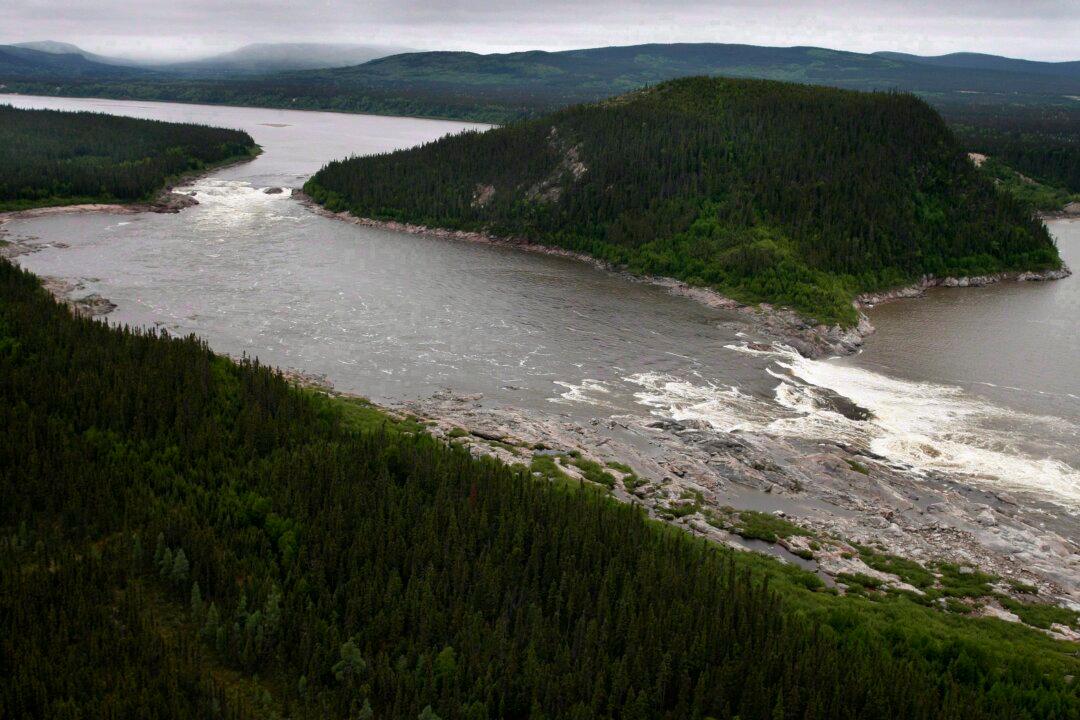ST. JOHN’S, N.L.—Newfoundland and Labrador will borrow $5 billion over 40 years to help finance the Muskrat Falls hydroelectric project, Premier Kathy Dunderdale said Tuesday as she announced that the federal loan guarantee for the development is finalized.
Dunderdale made the announcement Tuesday evening during a news conference at the provincial legislature in St. John’s.
“We are affirming that the Muskrat Falls project is indeed one of the most significant ventures Canada has ever undertaken,” Dunderdale said of the $7.7 billion development, which is under construction.
“This is a project with tremendous vision. Our province will be practically 100 percent renewable, powered by clean, emissions-free energy, and our electricity customers can bank on stable electricity.”
She said the completion of the loan guarantee will result in more than $1 billion in savings through lower interest rates and enabled the province to secure a $5 billion loan for the project to be repaid over 40 years at an interest rate of 3.8 percent.
Proponents of the development cleared a major hurdle last month when Nova Scotia’s Utility and Review Board approved the $1.5 billion Maritime Link. The subsea link would bring Muskrat Falls power to Nova Scotia as part of the joint project to help cut that province’s reliance on coal.
Prime Minister Stephen Harper affirmed the loan guarantee for Muskrat Falls a year ago, requiring that partners in both Nova Scotia and Newfoundland and Labrador remain committed.
The development is a joint venture between Nalcor Energy, Newfoundland and Labrador’s Crown utility company, and Nova Scotia utility company Emera.
Muskrat Falls will be capable of generating up to 824 megawatts of electricity with first power expected in 2017. About 170 megawatts would go to Nova Scotia annually for 35 years, serving around 10 percent of that province’s power needs.
The Maritime Link deal also grants Emera a commercial guarantee from Nalcor for access to cheaper market-priced power above that amount.
Nalcor is building the dam and power station in Labrador as well as transmission lines on the island of Newfoundland at an estimated cost of $6.2 billion.
Emera would build the 170-kilometre subsea Maritime Link to bring power from southwestern Newfoundland to Cape Breton.
The deal has been touted as a big step for cleaner, renewable energy. But it’s also the target of ongoing aboriginal protest in Labrador along with legal challenges.
“I find it a bit remarkable that the federal government has gone through with a loan guarantee,” said Todd Russell, president of the NunatuKavut Community Council. “At least two aboriginal groups in Labrador have outstanding court cases relative to issues of consultation.”
His group, representing about 6,000 Inuit-Metis in southern Labrador, has vowed to keep fighting the project.
“Environmentally, this is huge,” Russell said. He cited aboriginal concerns for how the dam and power station will affect not just the lower Churchill River but eight other waterways.
The Nunatsiavut government has also raised alarms about how potential mercury contamination from associated flooding could affect Lake Melville, a key food source for about 2,000 Inuit.
Nalcor says it has broadly consulted with aboriginal groups as part of lengthy environmental assessments. It has also maintained that any mercury pollution will be diluted to “no measurable effects” but has said it will monitor water samples.
Andrew Younger, now Nova Scotia’s energy minister, loudly criticized in opposition what he called undue risks for ratepayers and lack of information about the ultimate price of Muskrat Falls energy. He now says those concerns have been eased and the project is in the best interests of consumers.
“In the past eight weeks we’ve been able to address our concerns on the structure that we had with Emera and so forth.”
With files from The Canadian Press





